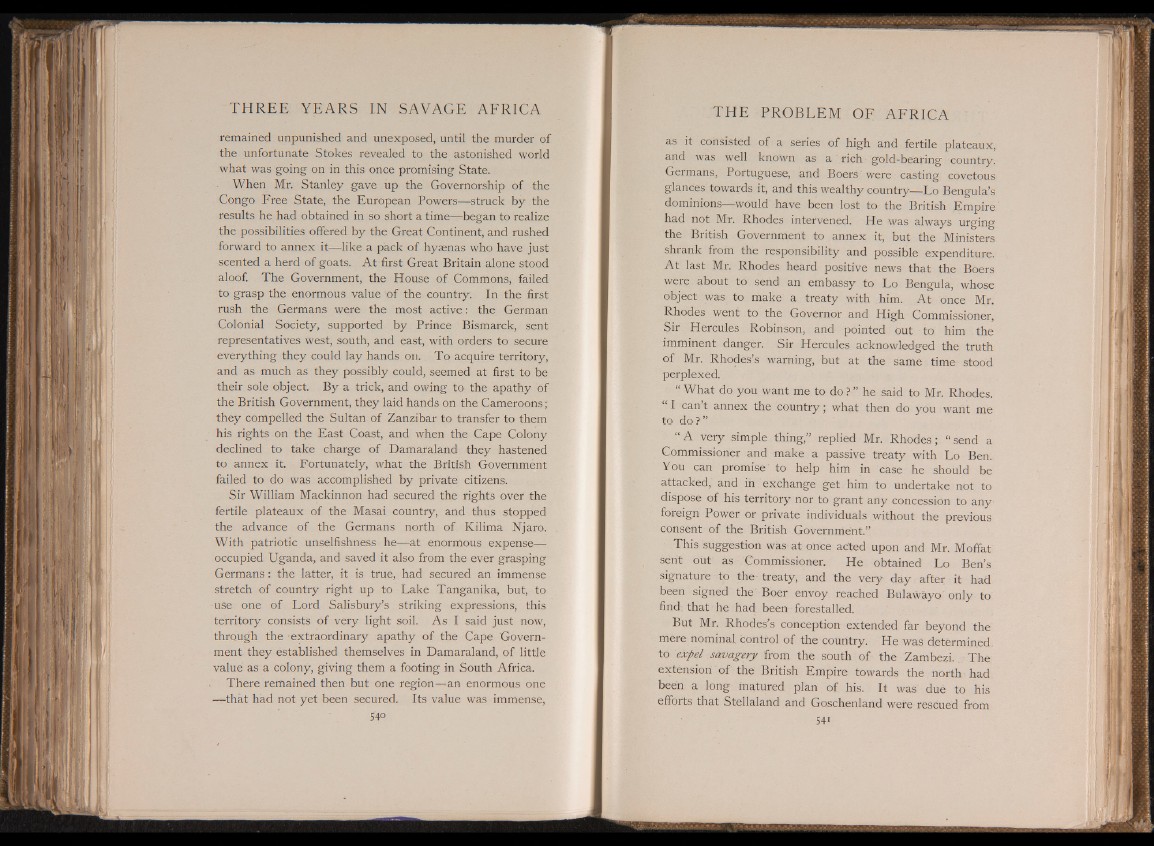
remained unpunished and unexposed, until the murder of
the unfortunate Stokes revealed to the astonished world
what was going on in this once promising State.
When Mr. Stanley gave up the Governorship of the
Congo Free State, the European Powers—struck by the
results he had obtained in so short a time—began to realize
the possibilities offered by the Great Continent, and rushed
forward to annex it—like a pack of hysenas who have just
scented a herd of goats. At first Great Britain alone stood
aloof. The Government, the House of Commons, failed
to grasp the enormous value of the country. In the first
rush the Germans were the most active : the German
Colonial Society, supported by Prince Bismarck, sent
representatives west, south, and east, with orders to secure
everything they could lay hands on. To acquire territory,
and as much as they possibly could, seemed at first to be
their sole object. By a trick, and owing to the apathy of
the British Government, they laid hands on the Cameroons;
they compelled the Sultan of Zanzibar to transfer to them
his rights on the East Coast, and when the Cape Colony
declined to take charge of Damaraland they hastened
to annex it. Fortunately, what the British Government
failed to do was accomplished by private citizens.
Sir William Mackinnon had secured the rights over the
fertile plateaux of the Masai country, and thus stopped
the advance of the Germans north of Kilima Njaro.
With patriotic unselfishness he—-at enormous expense—
occupied Uganda, and saved it also from the ever grasping
Germans: the latter, it is true, had secured an immense
stretch of country right up to Lake Tanganika, but, to
use one of Lord Salisbury’s striking expressions, this
territory consists of very light soil. As I said just now,
through the extraordinary apathy of the Cape Government
they established themselves in Damaraland, of little
value as a colony, giving them a footing in South Africa.
There remained then but one region—an enormous one
—that had not yet been secured. Its value was immense,
540
as it consisted of a series of high and fertile plateaux,
and was well known as a rich gold-bearing country.
Germans, Portuguese, and Boers were casting covetous
glances towards it, and this wealthy country—Lo Bengula’s
dominions—would have been lost to the British Empire
had not Mr. Rhodes intervened. He was always urging
the British Government to annex it, but the Ministers
shrank from the responsibility and possible expenditure.
At last Mr. Rhodes heard positive news that the Boers
were about to send an embassy to Lo Bengula, whose
object was to make a treaty with him. At once Mr.
Rhodes went to the Governor and High Commissioner,
Sir Hercules Robinson, and pointed out to him the
imminent danger. Sir Hercules acknowledged the truth
of Mr. Rhodes’s warning, but at the same time-stood
perplexed.
“ What do you want me to do?” he said to Mr. Rhodes.
“ I can’t annex the country; what then do you want me
to do?”
“ A very simple thing,” replied Mr. Rhodes; “ send a
Commissioner and make a passive treaty with Lo Ben.
You can promise to help him in case he should be
attacked, and in exchange get him to undertake not to
dispose of his territory nor to grant any concession to any
foreign Power or private individuals without the previous
consent of the British Government.”
This suggestion was at once acted upon and Mr. Moffat
sent out as Commissioner. He obtained Lo Ben’s
signature to the treaty, and the very day after it had
been signed the' Boer envoy reached Bulawayo only to
find, that he had. been forestalled.
But Mr. Rhodes’s conception extended far beyond the
mere nominal control of the country. He was determined,
to expel savagery from the south of the Zambezi. The
extension of the British Empire towards the north had
been a long matured plan of his. It was due to his
efforts that Stellaland and Goschenland were rescued from